- words you don't know their meaning — words the meaning of which you don't know. A "missing relative", common in IE.
- chappie — (("little fellow" – Partridge HS.))
- where's ... after getting to — where has he got to. An "after perfect", common in IE
-
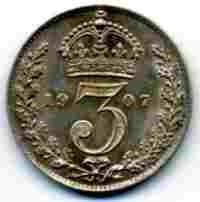 thruppenny piece — a threepence coin.
thruppenny piece — a threepence coin. - Dublin Bay — the crescent bay of the Irish Sea where Dublin is located. ^
- Glasthule — a suburban village some 7 miles south of Dublin. ^
- Howth — the headland forming the northern bound of Dublin Bay.
- the way — so that, with the result that ((Irish – OED.)) IE
- bang goes his sale — his sale is lost entirely. ((bang: "suddenly; immediately; utterly": colloquial – Partridge HS.))
- happy dosser — tramp. (("houseless vagrants who creep in, sleep on stairs, in passages, and in empty cellars" – Farmer 1904.))
- dog's life — (("a life of misery" – OED.))
-
 Mrs Conway — a named character who doesn't appear elsewhere in the novel. (("... Actually it's a mistake. It's supposed to be Mrs Conroy. But the names got mixed up some way or other. It was supposed to be a nod to Strong, of gratitude and respect" – JO'N.)) Mrs Conroy is a character in L.A.G Strong's semi-autobiographical novel, The Garden, 1931, which is also set in Glasthule, and at the same period. She is the grandmother of Dermot, the focal character.
Mrs Conway — a named character who doesn't appear elsewhere in the novel. (("... Actually it's a mistake. It's supposed to be Mrs Conroy. But the names got mixed up some way or other. It was supposed to be a nod to Strong, of gratitude and respect" – JO'N.)) Mrs Conroy is a character in L.A.G Strong's semi-autobiographical novel, The Garden, 1931, which is also set in Glasthule, and at the same period. She is the grandmother of Dermot, the focal character. - left foot — here the meaning is "Protestant". Either a mistake, or anachronistic; or both. …
left-footer: "a Roman Catholic" slang – OED; earliest quotation: 1944. left-footer: "a Roman Catholic" – Routledge Slang; "but there is also a suggestion that a left-footer is simply 'out of step' with the 'right-minded' user."
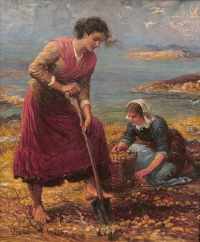 dig with the left foot: "be a Catholic" – Routledge Slang. ("from the Northern Irish saying that farm workers in Eire use the left foot to push a spade when digging" – Collins.)
dig with the left foot: "be a Catholic" – Routledge Slang. ("from the Northern Irish saying that farm workers in Eire use the left foot to push a spade when digging" – Collins.)
dig with the right/left/other/wrong foot: "sectarian characterisation of an individual of another religious persuasion (gen. Catholic / Protestant) Ulster – Slanguage.
cf. kick with the wrong foot: "to be of the opposite religion to that which is regarded as acceptable or to that of the person who is speaking" Scot. and Irish – Collins.
left-legger is sometimes used by Irish Catholics to describe a Protestant, from the belief that Protestants genuflect with the left leg, whilst RCs genuflect with the right.
None of these idioms seems to date much earlier than the 1940s. Left-handedness, of course, has long been a designation of gaucheness and sinisterity. - without the airs — unpretentious. ((airs: "an assumed manner, affected appearance" – OED.))
- the quality — (("people of good social position" – OED.))
- mistook — mistaken for "mistaken".
- thoolamawn — fool. ((thoolermawn: "blundering fool" – Slanguage.))
- has it currently — who has it currently. Again, a "missing relative". IE
- by the holy — a "dodged" curse, or minced oath. (("very general among our people" – PWJ 1910.))
- bucko — (("young fellow" colloquial – DHE.)) (("used as a term of address to a man. Slightly derisive, or at least kidding" 1890 – Routledge Slang.))
- getting of bronze for silver — exchanging higher-denomination silver coins for lower-denomination bronze ones. This "getting of", merely meaning "getting", sounds quite archaic: "... while I was getting of the pen and ink-horn, and the sheet of paper" – Maria Edgeworth, Castle Rackrent, 1800.
- the hades — the hell. ((used trivially – OED.))
- bagmen — commercial travellers. ((pejorative and colloquial – Partridge.)) But cf. (("... a bagman, as they call that sort of globe-trotting fellow that knocks about from one place to another, and takes all the fun he can out of it at other people's expense" – Somerville & Ross, All on the Irish Shore, 1903.))
- go-boys — opportunists. ((go-boy: "juvenile delinquent, chancer" – Slanguage.)) (("worthless person, of no value to anyone, but who is not aware of this himself" – DHE.))
- on the make — out for what they can get. (("intent on booty or profit" – Partridge HS.))
- on the cadge — looking for free drinks. ((cadge: "the act or the practice of begging" low colloquial – Partridge HS.)) (("For example, a waiter when hanging about for 'a tip' is said to be cadging or 'on the cadge'" – Farmer 1904.))
- decent skin — a good generous person. (("decent oul' skins; never see you caught for the price of a smoke, a read of the paper or the loan of a pump for your bike..." Slanguage.)) (("to say that a person was 'a dacent poor skin' was the highest praise" – Máirín Johnston, Around the Banks of Pimlico, 1985.))
- no more side than a margarine — ? very unpretentious. ((side: "conceit, swagger, pretentiousness" – Partridge HS.)) Margarine – ? perhaps from margarine, a lowly substitute, having no pretensions to being butter. Except that it has.
- could not engage — could not be certain. (("'I'll engage you visited Peggy when you were in town': i.e. I assert it without much fear of contradiction: I warrant" – PWJ 1910.))
- rise — ((take a rise out of (one): "to raise a laugh at, by some form of pretence or dissimulation" – OED.))
- consumptive — affected by Consumption, an old term for tuberculosis (TB).
- carry me out and bury me decent — exclamation of incredulity ((colloquial – Partridge HS.)) cf. < "Carry me out", Prologue, Pt 1.
- swell away — ? mixture of "well away" (prospering) and "swell": (("a well-dressed, fashionable man" – Routledge Slang.))
- high-jinkers — ? the gentry. ((at one's high jinks: "stiffly arrogant in manner" low colloquial – Partridge HS.)) (("the gorgeous high-jinkers of Irish society" – O'Casey 1.))
- damn the begrudgers — common IE catchphrase dismissive of begrudgers (("who consistently and jealously belittle the achievements of others" – Slanguage.))
- on the up — rising in prosperity. ((up: "a rise in life" – OED.))
- shocks and stares — perhaps literally, but also a play on "stocks and shares", the trading of which the Irish Times would report.
- fling — sarcastic remark (("thrown out in passing" – OED.)) fox-paw — a mispronunciation of French faux pas, "mistake".
- certain sure — absolutely certain. (("rather illiterate" – Partridge HS.))
- dee — penny.
- talked small — ? fashioned from ((small talk: "light talk or conversation" – OED.))
- not a mag to bless himself with — no money at all. ((mag: "a halfpenny" slang – OED.))
- old sweat — old soldier. ((military "ex his strenuous efforts" – Partridge HS.))
- had the change found — had found the change. A "literal perfect", frequent in IE
-
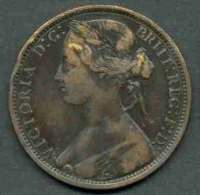 the old Queen — Queen Victoria (reigned 1837–1901). These pennies from early in her reign are known as "bun pennies".
the old Queen — Queen Victoria (reigned 1837–1901). These pennies from early in her reign are known as "bun pennies". - squeeze me peas — formed on "Excuse me, please!" cf. < "Pardon me parsnips", Prologue, Pt 1.
- amn't I — am I not, aren't I. IE
- flump — the action of or sound accompanying 'flumping'. ((flump: "to fall or move heavily with a dull noise" – OED.))
-
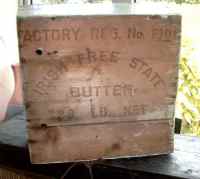 butter-box — (("box in which creamery butter has been sold" – Irish statute.)) Butter-boxes, being well made, were frequently appropriated by the poor for household furniture. ^
butter-box — (("box in which creamery butter has been sold" – Irish statute.)) Butter-boxes, being well made, were frequently appropriated by the poor for household furniture. ^ - none too gaudy — not too well, healthy. ((Partridge HS.))
- this weather — the present time. ((Slanguage.)) A carry-over from Irish-Gaelic – aimsir in Irish means both "weather" and, idiomatically, "time".
- that box wouldn't know — ? Mr Doyle appears so frail that even the box would be unaware of his weight.
- copper — penny. ((OED.))
- chancy — unsure, uncertain, untrustworthy. ((colloquial – Partridge HS.))
- Are you all right there, Mick — Be right in a minute, Arthur ... a sudden switch to first name terms.
- bang goes sixpence — (("jocular catchphrase applied to any small expense incurred, esp. if on entertainment or with a light heart" from ca 1880 – Partridge.))
- shilling — 12 pence. bob — shilling. ((OED.))
- fought for Queen and Country — a usual phrase amongst jingoists. The "Queen" here is Victoria and the "Country" is, of course, the United Kingdom. …
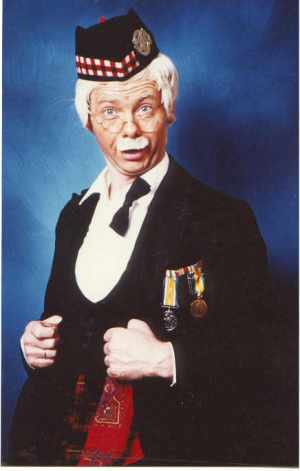
Did I ever use the bay'nit, sir?
In the far off Transvaal War,
Where I fought for Queen and country, sir,
Against the wily Boer.
from The Ballad of the Bayonet, in Corpl PT Ross, A Yeoman's Letters, 1901. -
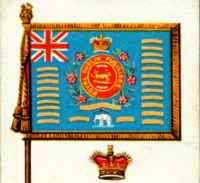 with the Colours — serving with a regiment. ((colours: "a pair of silk flags borne by a military unit, esp. British, comprising the Queen's Colour showing the unit's crest, and the Regimental Colour showing the crest and battle honours" – Collins.)) (("I'm as staunch a Britisher as you are, sir. I fought with the colours for king and country" – Joyce, Ulysses, 1922.))
with the Colours — serving with a regiment. ((colours: "a pair of silk flags borne by a military unit, esp. British, comprising the Queen's Colour showing the unit's crest, and the Regimental Colour showing the crest and battle honours" – Collins.)) (("I'm as staunch a Britisher as you are, sir. I fought with the colours for king and country" – Joyce, Ulysses, 1922.)) - went me pound — ? ((go one's pound: "to eat something up" military ca 1870-1914. "Ex the fact that a soldier's ration of bread used to weigh 1 lb., his ration of meat nearly 1 lb." – Partridge.)) (("to eat a thing up" – Farmer 1904.)) Mr Doyle seems to be saying "I went the whole way" or somesuch.
- Bojers — Boer soldiers. (("in the South African War" – Partridge.))
- Old Tough — nickname for a member of the Royal Dublin Fusiliers (specifically, of the 2nd Battalion) ((JS Farmer, Regimental Records of the British Army, 1901.))
- hike in the excise — rise in excise duties. ((hike: "an increase in prices, wages, etc." – OED.)) An anachronism: OED gives earliest quotation as 1931, in Kansas, USA.
-
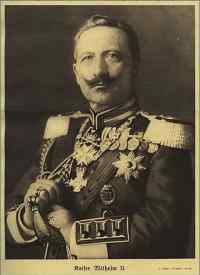 those Kaiser lads — German soldiers. ((Kaiser: "from 1871, the German emperor" – OED.))
those Kaiser lads — German soldiers. ((Kaiser: "from 1871, the German emperor" – OED.)) - lotion — an alcoholic drink. ((Partridge HS.))
- segotia — old friend. (("term of endearment" origin obscure; "it has been suggested that it derives from a corruption of Irish seo dhuitse = 'here it is you are'" – DHE.))
- may your hand be stretched ... ex Irish proverbial (("May your right hand always be stretched out in friendship, and never in want" – Paul Dickson, Over 1,500 of the Best Toasts, etc., 1981.)) ... and never your neck — punning stretch "to reach out" and ((stretch: "to be hanged" obsolete – OED.))
- price of a skite — the cost of having a few drinks. ((skite: "a jollification, a spree" – OED.)) ((on the skite: "engaged in serious drinking" – Slanguage.))
- happened — happened to. IE
- young fellow was here on this patch — the youngster who had this "patch", i.e. the newspaper-stand, before Mr Doyle. A missing relative: IE
- carted away — arrested. ((cart away: "to remove" colloquial – Partridge HS.))
-
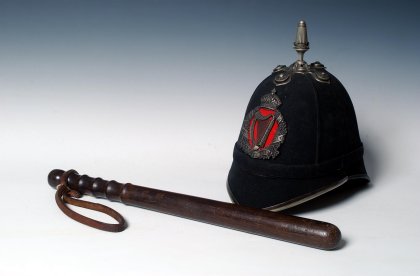 peelers — policemen. (("after Sir Robert Peel, as founder of the Irish constabulary, 1817" – Partridge.)) cf. "Bobby", the usual nickname for a policeman in England, after the same Sir Robert Peel, who in 1829 founded the London Metropolitan Police.
peelers — policemen. (("after Sir Robert Peel, as founder of the Irish constabulary, 1817" – Partridge.)) cf. "Bobby", the usual nickname for a policeman in England, after the same Sir Robert Peel, who in 1829 founded the London Metropolitan Police. - nabbed him — arrested him. ((low slang – Partridge HS.))
- recruitment poster — recruitment poster for the British Army, defacement of which was a serious crime under the wartime Defence of the Realm Act, 1914.
- two-monthser — ? a term of two months in prison. cf. ((sixer: "six months' hard labour" low slang – Partridge HS.)) hard — with ((hard labour: "the penalty of compulsory physical labour imposed in addition to a sentence of imprisonment" – Collins.))
-
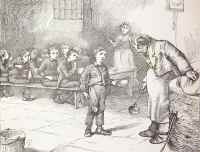 mild as ever on porridge smiled — meek-looking. ((as mild as ever on stirabout smiled: applied to a person when "smooth-tongued, meek-looking, over civil, and deceitful" – PWJ 1910.)) ((stirabout: "a kind of porridge orginally made in Ireland" – Collins.))
mild as ever on porridge smiled — meek-looking. ((as mild as ever on stirabout smiled: applied to a person when "smooth-tongued, meek-looking, over civil, and deceitful" – PWJ 1910.)) ((stirabout: "a kind of porridge orginally made in Ireland" – Collins.)) - only the one place ... — i.e. the grave.
- give 'em socks — get the better of them, "sock it to them". ((to give (one) socks: "to give a sound thrashing or beating" – OED.)) Punning on "stockings".
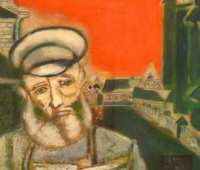
| UK | US-h | US-p | |
|---|---|---|---|
| Pages | 7-14 | 13-19 | 3-9 |
| POV | Mr Mack | ||
| Where | outside Fennelly's public house, Glasthule | ||
| When | Wednesday late morning, May 5 1915 | ||